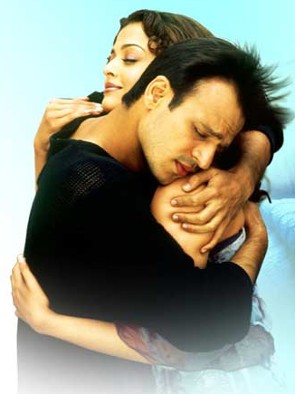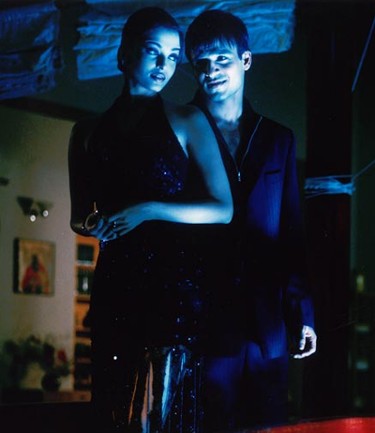
 |
  There are moments where Samir Karnik’s “Kyun! Ho Gaya Na...” goes on auto-pilot; that is, the debutante writer-director’s glaring inabilities take a backseat, and Aishwarya Rai and Vivek Oberoi’s natural chemistry, grace, and charm are given the opportunity to uninhibitedly unfold on screen. The most striking example of this is also the most literal - Karnik has a cameo early in the film as a struggling filmmaker who moans about his inability to script a convincing finale for his new romantic epic. As the director whines about his writer’s block, Oberoi’s character Arjun offers a solution by improvising a scene with Rai’s character Diya (a complete stranger to Arjun at this point in the narrative), in which he dramatically declares his love for her. There are moments where Samir Karnik’s “Kyun! Ho Gaya Na...” goes on auto-pilot; that is, the debutante writer-director’s glaring inabilities take a backseat, and Aishwarya Rai and Vivek Oberoi’s natural chemistry, grace, and charm are given the opportunity to uninhibitedly unfold on screen. The most striking example of this is also the most literal - Karnik has a cameo early in the film as a struggling filmmaker who moans about his inability to script a convincing finale for his new romantic epic. As the director whines about his writer’s block, Oberoi’s character Arjun offers a solution by improvising a scene with Rai’s character Diya (a complete stranger to Arjun at this point in the narrative), in which he dramatically declares his love for her. If this sequence stands out as one of the most earnest and sincere in the entire film, it’s because it isn’t forced in the slightest. Oberoi’s delivery and body language is at once comic and compelling, and Rai matches him step for step. There is no direct verbal exchange between the leads, but the dynamic between them is gripping. Without a doubt, the scene achieves its intended effect effortlessly. Unfortunately, the ease ends there. Karnik’s in-movie director rejoices having got his scene, and Oberoi’s character relegates control back to the dilettante with the line, “Mein iska kam karoonga to mera kam kaun karega,” (If I do his work for him, who’ll do mine?) Karnik gets back to work but, unfortunately, his self-deprecating avatar in the film isn’t too far from reality. His screenplay, in which a boy inexplicably dedicated to the idea of an arranged marriage spurns the advances of an idealistically romantic girl, is all of drawn-out, formulaic, and downright preposterous at times. The narrative rambles through all the tried-and-true motions of the Bollywood romance picture, and incorporates one inane subplot after the other every time the central storyline runs out of steam. Before the film reaches its absurd (albeit predictable) end, which is made possible only through the unabashed employment of an entirely unconvincing deus-ex-machina, audiences will have sat through more than a half-a-dozen underdeveloped subplots ranging from the story of an orphan’s failed attempts to get adopted to a love triangle with guest star Suneil Shetty as Oberoi’s foil.
Not surprisingly, the seasoned members of the cast fare far better than the leads, probably because they are better able to maneuver around haphazard direction. Rati Agnihotri and Om Puri are especially delightful throughout the film; not only do they perform their own roles with remarkable charm, they also share an amazing rapport with Oberoi and Rai on screen. The funny scenes involving the four of them are easily the most enjoyable of the movie. Later in the film, Amitabh Bachchan’s character provides some necessary life-support to the proceedings in the form of uplifting comic relief and a much needed sense of gravitas. A scene in which a drunk Bachchan and Oberoi discuss their love lives as Rai looks on is probably the most redeeming in the lackluster second half of the film; we start feeling for the characters again, and we realize what’s at stake for Arjun if he doesn’t understand his feelings for Diya soon enough. Oberoi is unquestionably excellent in that scene opposite Bachchan. It seems that all of today’s worthwhile actors must have their defining moments opposite Bachchan, and Oberoi makes the most of his screen time with The Living Legend. In the rest of the film however, the youngster’s performance is hit-and-miss. He nails certain scenes with all the conviction of an established thespian but fails to convince in many others. The same is true of Ms. Rai, who is spellbinding in a number of emotional scenes, but comes off unimpressive far too often. Fortunately, Oberoi and Rai do share an undeniable chemistry that works for the film is a very good way. This connection is most prominent in a handful of quiet scenes in which both of them speak very little but express volumes through subtle shifts in their eye-contact - and despite the many verbose, dramatic scenes that fill the rest of the feature, these are the ones that really convince us of the yearning and pathos of the protagonists.
If only the rest of the film were as spectacular. “Kyun! Ho Gaya Na...” is not a terrible film, and certainly manages to entertain throughout its duration, but it is something of a disappointment. It could have been so much more, and in so many ways: so much more believable, so much more engaging, so much more enjoyable. As it is, it’s guaranteed to keep the lead pair’s fans satisfied and detractors unconvinced; it’s too weak of an effort to tip the scales in any one direction or elicit any definitive response. But Oberoi and Rai cannot be faulted; the blame belongs to writer-director Karnik. The stars can only do so much - or else, as Arjun wonders in the film, who would do their job?
|
| Comments | Contact Us | Advertise | Terms of Service | Privacy Policy |